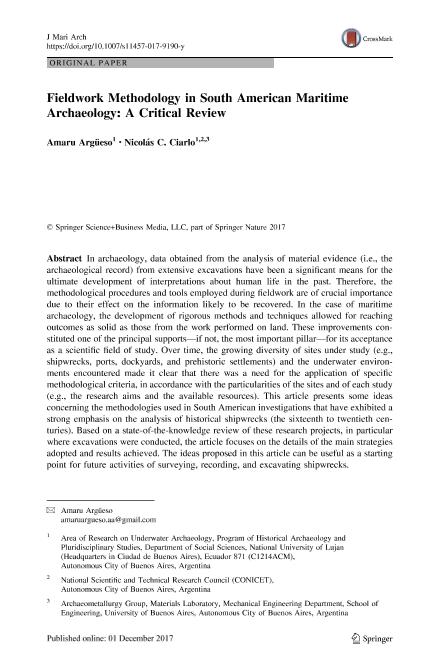Mostrar el registro sencillo del ítem
dc.contributor.author
Argüeso, Amaru
dc.contributor.author
Ciarlo, Nicolás Carlos

dc.date.available
2019-04-05T19:40:55Z
dc.date.issued
2017-12
dc.identifier.citation
Argüeso, Amaru; Ciarlo, Nicolás Carlos; Fieldwork Methodology in South American Maritime Archaeology: A Critical Review; Springer New York LLC; Journal of Maritime Archaeology; 12; 3; 12-2017; 179-197
dc.identifier.issn
1557-2285
dc.identifier.uri
http://hdl.handle.net/11336/73348
dc.description.abstract
In archaeology, data obtained from the analysis of material evidence (i.e., the archaeological record) from extensive excavations have been a significant means for the ultimate development of interpretations about human life in the past. Therefore, the methodological procedures and tools employed during fieldwork are of crucial importance due to their effect on the information likely to be recovered. In the case of maritime archaeology, the development of rigorous methods and techniques allowed for reaching outcomes as solid as those from the work performed on land. These improvements constituted one of the principal supports—if not, the most important pillar—for its acceptance as a scientific field of study. Over time, the growing diversity of sites under study (e.g., shipwrecks, ports, dockyards, and prehistoric settlements) and the underwater environments encountered made it clear that there was a need for the application of specific methodological criteria, in accordance with the particularities of the sites and of each study (e.g., the research aims and the available resources). This article presents some ideas concerning the methodologies used in South American investigations that have exhibited a strong emphasis on the analysis of historical shipwrecks (the sixteenth to twentieth centuries). Based on a state-of-the-knowledge review of these research projects, in particular where excavations were conducted, the article focuses on the details of the main strategies adopted and results achieved. The ideas proposed in this article can be useful as a starting point for future activities of surveying, recording, and excavating shipwrecks.
dc.format
application/pdf
dc.language.iso
eng
dc.publisher
Springer New York LLC
dc.rights
info:eu-repo/semantics/openAccess
dc.rights.uri
https://creativecommons.org/licenses/by-nc-sa/2.5/ar/
dc.subject
Fieldwork Methodology
dc.subject
Maritime Archaeology
dc.subject
Shipwrecks
dc.subject
South America
dc.subject.classification
Historia

dc.subject.classification
Historia y Arqueología

dc.subject.classification
HUMANIDADES

dc.title
Fieldwork Methodology in South American Maritime Archaeology: A Critical Review
dc.type
info:eu-repo/semantics/article
dc.type
info:ar-repo/semantics/artículo
dc.type
info:eu-repo/semantics/publishedVersion
dc.date.updated
2019-04-05T18:21:38Z
dc.identifier.eissn
1557-2293
dc.journal.volume
12
dc.journal.number
3
dc.journal.pagination
179-197
dc.journal.pais
Estados Unidos

dc.journal.ciudad
Nueva York
dc.description.fil
Fil: Argüeso, Amaru. Universidad Nacional de Luján. Departamento de Ciencias Sociales; Argentina
dc.description.fil
Fil: Ciarlo, Nicolás Carlos. Consejo Nacional de Investigaciones Científicas y Técnicas; Argentina. Universidad de Buenos Aires. Facultad de Filosofía y Letras. Instituto de Arqueología; Argentina. Universidad de Buenos Aires. Facultad de Ingeniería. Departamento de Ingeniería Mecánica; Argentina
dc.journal.title
Journal of Maritime Archaeology
dc.relation.alternativeid
info:eu-repo/semantics/altIdentifier/url/https://link.springer.com/article/10.1007/s11457-017-9190-y
dc.relation.alternativeid
info:eu-repo/semantics/altIdentifier/doi/https://dx.doi.org/10.1007/s11457-017-9190-y
Archivos asociados
